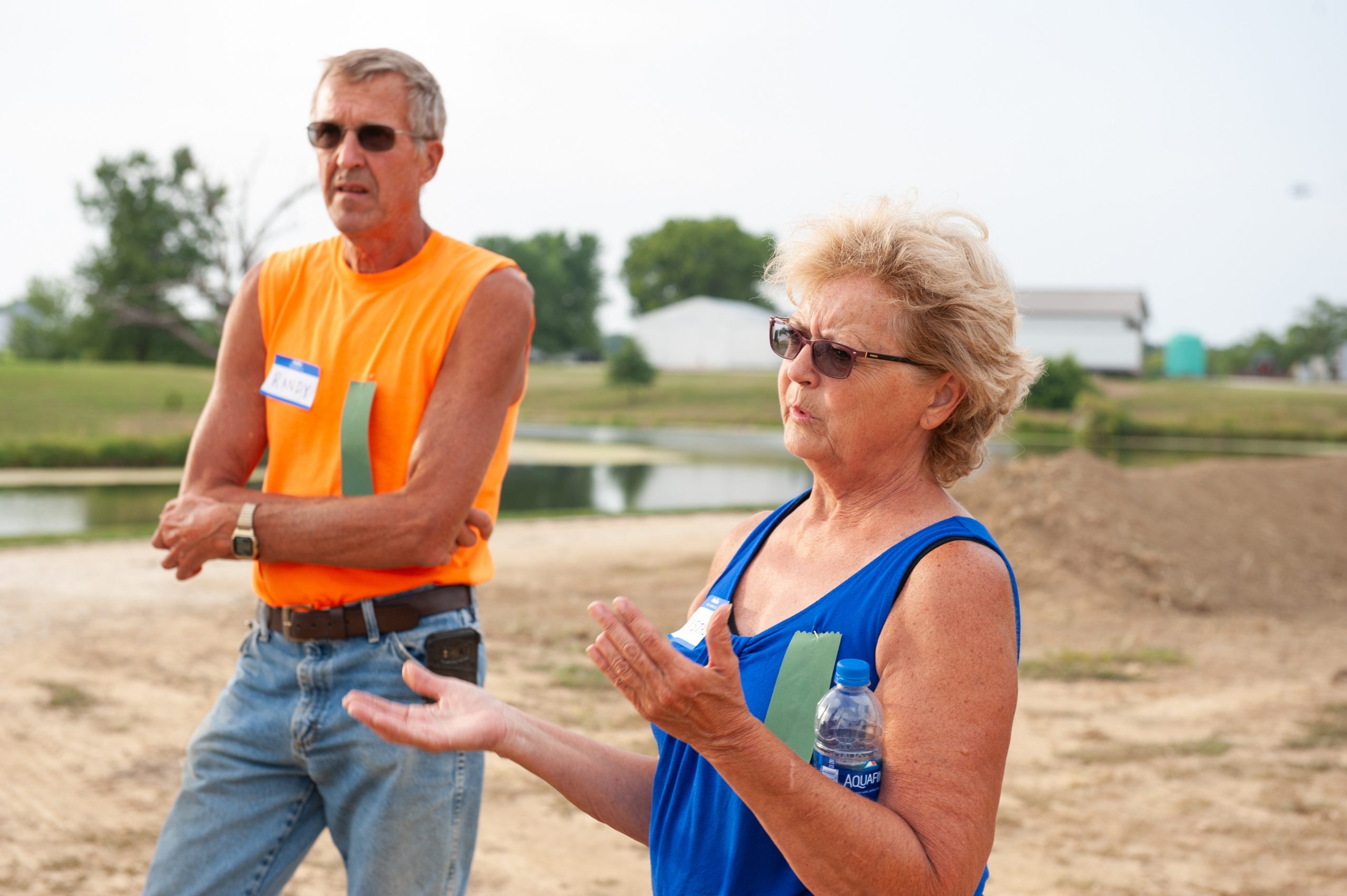Hog CAFO threatens health of farming couple, Randy and Crystal Clair, and their organic farm
One day in July, Crystal Clair received a strange package in the mail. She opened it and found a round piece of wire with tiny teeth like those on a saw blade. She didn’t know what it was but when she showed it to her husband, Randy, he told her it was a garrote, a strangulation device.
Why would anyone send the Clairs, who own an organic farm, Sunset Lake Organics, in west central Illinois, a weapon of death?
Crystal thinks the garrote may be a warning sent by supporters of confined animal feeding operations (CAFOs) who are angry about the Clairs’ opposition to a hog CAFO near their farm.
“Someone is trying to send us a message to keep us quiet.They’re trying to put the fear of the devil in me,” Crystal says.
The Clairs and their organic farming are threatened by a 5000-hog CAFO just 2208 feet, less than ½ of a mile, from their home that opened in 2019. The stench from the CAFO is forcing the Clairs to stay indoors and posing risks to their health; both Randy and Crystal have fought cancer. Manure runoff from the CAFO could also contaminate a lake on their organic farm that the Clairs rely on for irrigation and water for their compost operation.

Randy and Crystal Clair’s lake, which they use for irrigation and on their compost, is threatened by a hog CAFO.
Transitioned to organic to build soil health
The Clairs recently transitioned to organic farming after farming conventionally for 40 years. They farm 750 acres, growing a range of organic crops, including yellow corn, food-grade soybeans, blue corn, wheat, oats, and hay.
They transitioned to organic because they saw that conventional methods were ruining their soil.
“I wasn’t doing the soil any good,” Randy says. “The only way I could see was to grow organically with the compost and try to get the life and health back in the soil.”
Health was also a factor in the Clairs’ decision to go organic. Crystal has suffered from breast cancer, while Randy had to deal with prostate cancer.
“I would suspect that all the chemicals that I handled when I was farming conventionally could’ve had a big effect on my cancer,” Randy says.
To build soil health, the Clairs developed an extensive composting system to increase the fertility of their soil.
“It’s made a difference,” Crystal says. “You can see the earthworms in the soil. The soil is forgiving now. You can walk on it and it springs back. It’s not rock hard.”
But the nearby hog CAFO could destroy the Clairs’ work—and the quality of their lives. They raised concerns about the hog confinement in 2018 when the owner, Ragan Peter, sought and received permission from the Illinois Department of Agriculture to build it.
Crystal says Peter visited them in May 2018. “This guy came up on our porch and told us if we continue to oppose this CAFO that our lives and our livelihood will never be the same,” she says.
The Clairs’ lives haven’t been the same. This summer, the stench from Peter’s CAFO forced them to inside for eight days, unable to work on their farm.
“This summer has been pretty miserable,” Randy says. “The smell makes Crystal sick. It makes me angry that I have to work in those conditions.”
“My doctor told me that I can’t be breathing this stuff; that it would kill my immune system,” says Crystal. “I get a headache, a stomach ache, and my eyes burn.”
CAFOS produce massive amounts of manure
CAFOs, like Peter’s, are increasingly controversial in the U.S. The facilities hold anywhere from hundreds to thousands of animals such as hogs or chickens in tight quarters.
CAFOs produce massive amounts of manure, so much in fact, that University of Iowa research engineer Chris Jones estimates that Iowa, with a population of 3.2 million people—and 23 million hogs—produces more than twice the amount of fecal waste per square mile than California with its population of nearly 40 million.
Published studies have found that gases—ammonia and hydrogen sulfide—produced by stagnating liquid manure in CAFOs can cause respiratory problems, nausea, headaches, diarrhea, burning eyes, confusion, tension, depression, and post-traumatic stress. Children living near CAFOS are particularly at risk for asthma.
Manure also leaks from manure pits and can contaminate waterways like streams, lakes, and rivers, killing fish, and ruining waterways for recreational use.
Other problems caused by CAFOs include environmental damage, reduced quality of life and property values for homeowners living near them, and poor animal welfare.
With animals packed in tight quarters, CAFOs are breeding grounds for disease, leading CAFO owners to administer high doses of antibiotics, which could lead to antibiotic resistant bacteria that threaten human health.
Hog CAFOs could also breed the next pandemic, according to a recent article in Mother Jones. The article quotes Gregory Gray, professor of medicine, global health, and environmental health at Duke University and an expert on animal-to-human disease transmission, who says his biggest worry for the next pandemic is Influenza A viruses that originate in pigs.
CAFO supporters claim the facilities offer a more efficient system to feed and house animals; the facilities can produce more animals with less labor. Peter said his CAFO would benefit the local economy providing several jobs and tax income.
Manure could contaminate lake
The Clairs are concerned about manure from Peter’s hog confinement, which produces 1.2 million gallons of manure each year, contaminating their farm. To get rid of the manure, Peter must get permission from local farmers to spread it onto their lands. According to the Clairs, 45 acres of the land Peter is spreading manure onto drains into their 4.5-acre lake, which is essential to their farm. They use water from the lake to irrigate their compost site as well as vegetables in their greenhouse and garden. Manure drainage into their lake would devastate their farming operation and essentially turn their lake into a manure pit “200 feet from our doorstep,” according to Randy. He adds:“It’s just a matter of time before the manure contaminates the farm.”
At a public meeting in 2018, Peter said the chance of manure running off into nearby waterways such as the Clairs’ lake was “very slim” and that he wasn’t worried about it happening.
But manure from Peter’s CAFO has already polluted a pond and stream that empties into the Mississippi River, according to a freedom of information act request from the U.S. Environmental Protection Agency that the Clairs obtained.
“We were here for 45 years before he showed up”
What recourse do the Clairs have? Regulations of hog confinements, such as they are, favor CAFO owners and big agriculture, says Liz Moran Stelk, executive director of the Illinois Stewardship Alliance.
“Similar versions of the Clairs’ story are playing out all over the state,” she says. “Government has had its finger on the scales in favor of conventional agriculture. There are decades of policy that favor the (CAFO owning) neighbor. It’s out of balance, and there’s very little people can do.”
Moran Stelk says many organic farmers end up filing lawsuits because they see no other recourse to damage from CAFOs, pesticide drift, or other challenges from conventional agriculture.
“They feel alone and that they have to defend themselves even though no one wants to be litigious,” she says.
The Clairs are considering legal action because they say their property rights are being denied. “Our right to do what we want to do on our farm when we want to do it is being stripped from us because the odor is so bad it’s hard to even describe,” Crystal says. “We’ve never wanted to sue anybody, but who is going to stand up for us?”
“We were here for 45 years before he showed up,” Randy says.
Fortunately, the Clairs aren’t alone in their fight. They have formed a coalition with six other neighbors facing the same challenges with Peter’s CAFO.
The Clairs are fighting to keep their organic farm. “We were here first and we are thriving, but it has been a living hell. If we weren’t organic, we would have probably packed up and moved, but we have so much invested in this,” Crystal says.
Moran Stelk says Illinois needs more farmers like Randy and Crystal Clair but it’s unfortunate that they face such challenges.
“They’re doing really good work prioritizing soil health and using compost. But we’re making it really hard for farmers like them to thrive, and for what?”





